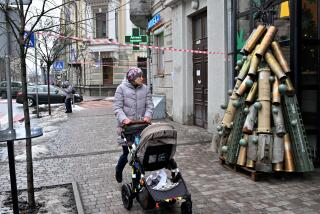Deaths from natural causes spike during the holidays
- Share via
If Uncle Charlie is feeling an unusual pain or discomfort during Christmas dinner or while watching a New Year’s bowl game, it might be best to get him to the doctor promptly.
A new study has found that people are at the highest risk of dying from natural causes, such as heart attacks, on Christmas, the day after and New Year’s. An analysis of 26 years of death certificates from across the United States found that death rates on those days are, on average, 12% higher than what would normally occur on a winter day.
The higher death rate may be a result of people putting off getting medical treatment during the holidays or receiving inferior care if they do seek treatment, said David Phillips, a UC San Diego sociologist and the study’s lead researcher.
“The most plausible explanation we’ve found so far is that people seem to be postponing medical care until after the holidays,” said Phillips. Also, when people travel during the holidays, he said, “they are less able to find medical care because they are in strange territory.”
Published last week in the American Heart Assn. journal Circulation, the study is believed to be the largest to date documenting the so-called “holiday effect” on death rates. Previously, the higher death rates during the holidays were often attributed to colder weather.
The study by researchers at UC San Diego and Tufts University is the first to document that deaths not only peak during the two-week holiday period -- they were up 4.5% to 5% compared with other winter days -- but that there are specific spikes (“twin peaks” as Phillips calls them) on Dec. 25 and 26 and Jan. 1. The researchers also found that holiday death rates have been steadily rising during the last two decades.
The study examined 53 million death records in a 26-year period in the National Center for Health Statistics’ database, focusing on the two weeks from Dec. 25 to Jan. 7 (so that the deaths of those who suffered ailments over the holidays but lingered were more likely to be included). The largest holiday spikes came in the number of people who were declared dead on arrival at a hospital, died in the emergency room or as outpatients. Deaths of hospital inpatients also rose during the holidays, but more modestly: 1.6%.
The research built on a 1999 study in Circulation by Robert Kloner of USC that examined 222,265 death records from Los Angeles and found that cardiac deaths in December and January were 33% higher than in summer months, with a dramatic increase in deaths starting at Thanksgiving and continuing through the New Year’s holiday.
The “twin peaks” phenomenon found by the researchers occurred in all but two of the 26 years studied: in 1973 and 1981. “Was this a fluke or are these years unusual in some way?” Phillips and his coauthors wrote. They speculated that Americans traveled less during those years, due to an OPEC embargo on oil exports to the U.S. in 1973 and the recession in 1981.
The study did not include deaths from accidents, homicides or suicides, although other studies have indicated that such deaths also rise during the holidays.
Largely because death rates for patients with Alzheimer’s disease also rose, the researchers discounted other possible causes for the “holiday effect,” such as the extra emotional stress of the holidays and the depression or “blues” that many suffer during the period.
“If what was happening is emotional stress, you’d expect the peaks to be smaller if you had end-stage Alzheimer’s disease,” Phillips said. “But the peak is just as big. That suggests that it’s not coming from an emotional reason.”
Anthony Don Michael, a Bakersfield cardiologist and obesity specialist, says coronary problems definitely rise during the holidays due to many factors including stress, increased consumption of fatty foods that boost cholesterol that clogs arteries, and respiratory infections. “During Christmas, people are traveling and lugging suitcases, losing sleep and getting on planes, and they’re often already sick with a cold or the flu or something in between. If there’s an infection already, it makes the plaque (in the arteries) more unstable” and can trigger a heart attack.
Don Michael notes that people are even more likely to put off getting medical attention during the holidays because they have plans or are visiting relatives and don’t want to make a scene. “If you have chest pains and there’s a party tomorrow and you’re in a foreign place, you don’t want to burden others.”
While praising the size of the study, Dr. Andrew Leuchter, a professor of psychiatry at UCLA, cautioned that statistical analyses of data were complicated and that his study made some assumptions that needed to be replicated to be conclusive.
He also questioned some of the researchers’ speculation about the possible causes for the higher death rates, noting that, for example, one shouldn’t assume that Alzheimer’s patients would be unaware of the holidays. “Anybody who has ever spent any time in a nursing home knows that there’s holiday music blaring, decorations everywhere and families are more likely to be visiting,” he said. “Certainly there’s more activity and commotion.”






